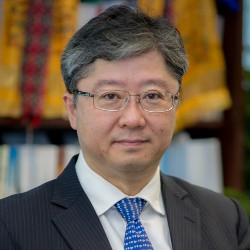Urban Transformations & Regional Resilience | Virtual Lecture Series
Urbanization, Infrastructure, & Inclusive Growth in Asia

Yasuyuki Sawada
Wednesday, February 3, 2021
12:00 - 1:30 PM (EST)
Registration Link | Flyer
Developing Asia is urbanizing rapidly. The number of urban inhabitants in the region has increased from 375 million in 1970 to 1.84 billion in 2017. The urbanization rate is projected to rise from 46% in 2017 to 64% by 2050. This rapid urbanization in Asia has been central to its structural transformation and growth. This seminar will discuss, first, basic features of urbanization in Asia. For this purpose, nighttime satellite imagery and grid population data are combined to assemble a dataset of 1,459 “natural cities” in developing Asia and track their footprint and population from 2000 to 2016. Analysis of this dataset reveals some important features of urbanization in developing Asia that are relevant to policy making. Second, examine the role of infrastructure in facilitating urban development. Specifically, employ daytime satellite imageries to quantify impacts of Nanpu bridge and other river crossings on rapid development of Shanghai. Third, with a variety of datasets, show that by enabling workers and firms to interact closely, cities generate increases in productivity through several channels, collectively known as agglomeration economies. Finally, discuss a holistic agenda for cities as a system, highlighting importance of connectivity infrastructure.
Yasuyuki Sawada holds a Doctorate degree in Economics and a Master's degree in International Development Policy from Stanford University, USA; a Master's degree in International Relations from the University of Tokyo, Japan; a Master's degree in Economics from Osaka University, Japan; and a Bachelor's degree in Economics from Keio University, Japan. Sawada is a Professor in the Faculty of Economics at the University of Tokyo, Japan. Earlier, he was an Associate Professor at the University of Tokyo; an Adjunct Professor of Economics at the Korea University; a Research Associate at the Australia-Japan Research Centre, Crawford School of Public Policy, Australian National University; and a Visiting Researcher at the Asian Development Bank Institute. Previously, he did part-time research work in a variety of institutions, such as the Japan International Cooperation Agency (JICA) Research Institute; the World Bank; Economic Research Institute of ASEAN and East Asia (ERIA); Bangladesh Institute of Development Studies (BIDS) Pakistan Institute of Development Economics (PIDE); International Rice Research Institute (IRRI) in the Philippines; International Water Management Institute (IWMI) in Sri Lanka; Research Institute of Economy, Trade, and Industry (RIETI) in Japan; and Japan Society of Promotion of Science (JSPS), where he led a number of large-scale development policy evaluation projects in Asia and other developing countries.
Sawada's research fields are macro- and micro-development economics, microeconometrics, economics of disasters, and field surveys and experiments. He has published more than 60 peer-reviewed research articles on diversified topics pertaining to Asia and other developing countries ranging from macro development issues, such as long-term economic growth and structural change, sovereign debt sustainability, foreign aid, trade, ageing and social security, and natural and man-made disasters to micro issues of poverty, education, infrastructure, microenterprises, microfinance, health, and disabilities. He conducted his research using a variety of methods, such as calibration, microeconometrics, and field experiments, in collaboration with governments, international institutions, NGOs, and private firms. Mr. Sawada is a highly qualified global macro- and micro-economist with deep hands-on field experience. He has expertise on how to measure and maximize development impacts of projects, and has led multiple policy-oriented research projects that cut across a wide range of sectors and themes. His publications are extensive and well acclaimed. His engagement in policy-oriented research projects under different institutions will contribute well to the role, especially in the design and implementation of ERCD’s vision to support ADB’s development goals.
